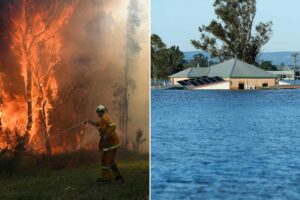Legislative amendments establishing the Morrison government’s $1 billion Grid Reliability Fund have finally been introduced into parliament, a step that may revive the governments plans to invest taxpayer funds in new gas generation, by redefining it as a ‘low emissions technology’.
Federal energy minister Angus Taylor introduced the Clean Energy Finance Corporation Amendment (Grid Reliability Fund) Bill into the federal parliament on Thursday, which will make the necessary legislative amendments that are required to establish the Morrison government’s $1 billion Grid Reliability Fund.
The bill makes a series of amendments to legislation that establishes the Clean Energy Finance Corporation, which will be tasked with administrating the Grid Reliability Fund and will be used to fund the government’s commitments made as part of the Underwriting New Generation Investments (UNGI) program.
Significantly, the amendments will expand the CEFC’s investment reach to include gas projects, under a refined definition of ‘low emissions technologies’.
“The fund will encourage private investment in the generation, energy storage and transmission projects needed to balance the grid and deliver affordable power,” Angus Taylor said while introducing the bill.
“The new fund will not divert the CEFC’s existing $10 billion allocation, and will not change the CEFC’s ability to make its own individual investment decisions. The fund will benefit energy market participants by providing a trusted counterparty to investments, allowing the CEFC to support private sector involvement.”
“Gas projects, which the CEFC can already invest in, including new gas fired generation, will be included in the fund when a project supports the achievement of low emission energy systems,” Taylor added.
“Battery technologies are intended to be eligible, regardless of how they source their electricity. Low emissions technologies under the CEFC Act will not extend to coal fired generation.”
The bill will finally see the government create the Grid Reliability Fund, first announced in October 2019, and almost two years after the UNGI program was initially announced. The first list of projects shortlisted under the UNGI program was announced in March 2019, but none of the projects have secured a final funding agreement with the federal government.
RenewEconomy understands that the design of the Grid Reliability Fund has undergone a number of iterations, as the Morrison government weighed up the level of control it wanted to take over the CEFC, as well as how wide its investment mandate could be expanded to include fossil fuel projects.
With added delays caused by Covid-19, and the subsequent suspension of parliament, the bill was effectively left in limbo, and the CEFC powerless to progress any investments under the UNGI program.
The bill will establish two separate funds, one for the CEFC’s existing investment allocation in clean energy technologies, and a second new fund to manage the investments made by the Grid Reliability Fund.
The Grid Reliability Fund will be used to make investments across a number of technologies, including energy storage, electricity generation, transmission or distribution infrastructure as well as ‘electricity grid stabilisation’ infrastructure.
Taylor indicated that when the bill has been passed by the parliament, that the government will issue a new investment mandate to the CEFC to guide investments under the Grid Reliability Fund.
Significantly, Taylor said that coal-fired generation would miss out under the fund, as it would effectively be excluded by a ‘low emission technology’ requirement, but gas generation will still be included in its expanded definition.
RenewEconomy is not aware of any gas projects that the CEFC has previously invested in, with the fund primarily focusing its investments in renewable energy projects, sustainable development funds and energy efficiency investments.
The legislation was immediately criticised by Australian Greens leader Adam Bandt, who said that “we must phase out gas, not bankroll gas corporations with public money.”
BREAKING: In a new bill, Libs are seeking to define gas as a 'low emissions' technology so that it can access public funds meant to support renewables.
In a climate emergency, we must phase out gas, not bankroll gas corporations with public money.
The Greens will fight this. pic.twitter.com/c6J1vaERZ0
— Adam Bandt (@AdamBandt) August 27, 2020
The Australia Institute likewise expressed disappointment in the proposed amendments, and suggested they could be an indication of how the Morrison government may also approach changes to the Australian Renewable Energy Agency.
“It is disappointing to see the definition of low-emissions technology watered down and left open for the CEFC Board to determine, with only a weak assurance in the legislation’s Explanatory Memorandum that the changes would not extend to supporting coal-fired electricity,” the Australia Institute’s climate and energy program director Richie Merzian said.
“It’s worth recalling the Australian Renewable Energy Agency will soon run out of funds and yet the Energy Minister Angus Taylor continues to find increasingly creative ways to find funding to underwrite fossil fuels. Forcing Australia’s Clean Energy Finance Corporation to deliver gas may yet be the tip of the iceberg.”
It is unclear whether the government intends to fund carbon capture and storage projects under the new fund.
The Morrison government has already shortlisted five gas fired generators under the UNGI program and has been considering the funding of upgrades at the Vales Point power station. Other shortlisted projects include pumped hydro energy storage projects, and will likely include support to develop the NSW government’s planned Renewable Energy Zones.
The status of the funding support for the Vales Point power station remains uncertain. It has been reported that the power station expects to receive $11 million to fund upgrades, but it would appear that it will miss out under the UNGI program. The government may seek to provide the power station funding through other means, such as providing direct funding under the federal budget to be delivered in October.
Correspondence between the owners of the Vales Point power station, Delta Electricity, and the federal energy department released under Freedom of Information laws suggest that Vales Point is revising its assessment of investment needs, following Covid-19 related developments in the energy market.
The bill will be debated by the parliament during a future sitting period, before being considered by the Senate.










